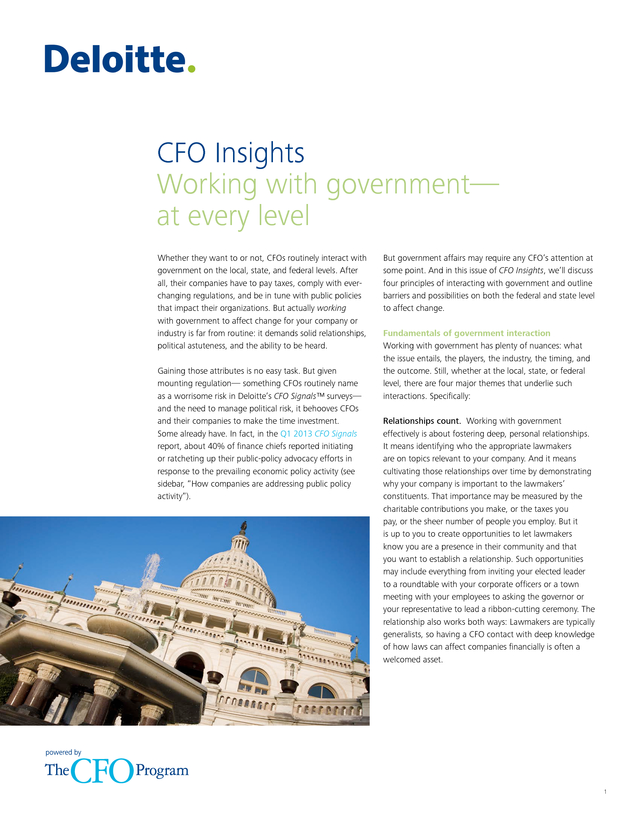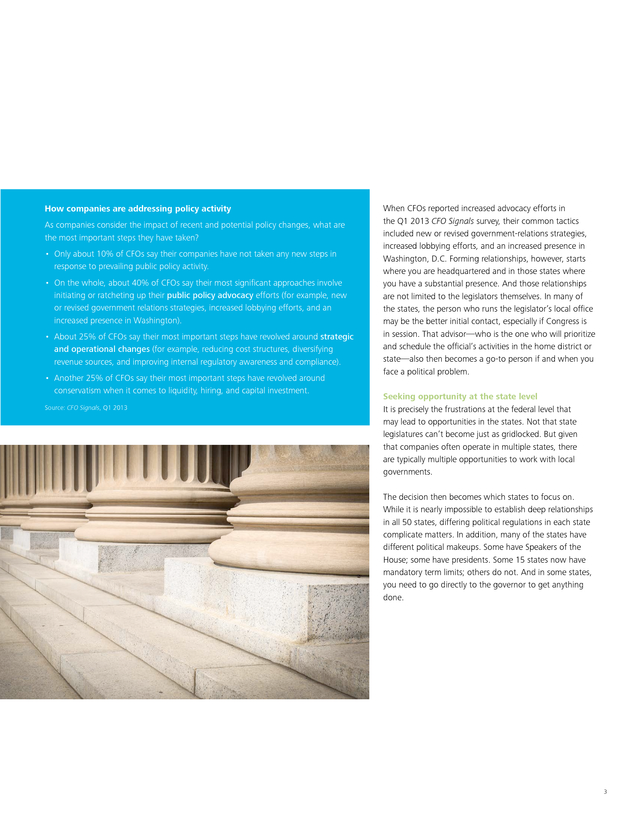Description
CFO Insights
Working with government—
at every level
Whether they want to or not, CFOs routinely interact with
government on the local, state, and federal levels. After
all, their companies have to pay taxes, comply with everchanging regulations, and be in tune with public policies
that impact their organizations. But actually working
with government to affect change for your company or
industry is far from routine: it demands solid relationships,
political astuteness, and the ability to be heard.
Gaining those attributes is no easy task. But given
mounting regulation— something CFOs routinely name
as a worrisome risk in Deloitte’s CFO Signals™ surveys—
and the need to manage political risk, it behooves CFOs
and their companies to make the time investment.
Some already have.
In fact, in the Q1 2013 CFO Signals report, about 40% of finance chiefs reported initiating or ratcheting up their public-policy advocacy efforts in response to the prevailing economic policy activity (see sidebar, “How companies are addressing public policy activity”). But government affairs may require any CFO’s attention at some point. And in this issue of CFO Insights, we’ll discuss four principles of interacting with government and outline barriers and possibilities on both the federal and state level to affect change. Fundamentals of government interaction Working with government has plenty of nuances: what the issue entails, the players, the industry, the timing, and the outcome. Still, whether at the local, state, or federal level, there are four major themes that underlie such interactions.
Specifically: Relationships count. Working with government effectively is about fostering deep, personal relationships. It means identifying who the appropriate lawmakers are on topics relevant to your company. And it means cultivating those relationships over time by demonstrating why your company is important to the lawmakers’ constituents.
That importance may be measured by the charitable contributions you make, or the taxes you pay, or the sheer number of people you employ. But it is up to you to create opportunities to let lawmakers know you are a presence in their community and that you want to establish a relationship. Such opportunities may include everything from inviting your elected leader to a roundtable with your corporate officers or a town meeting with your employees to asking the governor or your representative to lead a ribbon-cutting ceremony.
The relationship also works both ways: Lawmakers are typically generalists, so having a CFO contact with deep knowledge of how laws can affect companies financially is often a welcomed asset. 1 . Make contact before you need to. You don’t want to be in a position where a political issue arises for your company and you don’t know the decision maker. That means projecting what legislation is coming down the pike and working with your government-affairs department or lobbyists to figure out who’s going to be the champion on a particular issue—now and going forward. Building your network isn’t solely to secure a voice on big issues, such as health care or environmental policy, either. It is about securing opportunities to educate policymakers about your issues, so that they will make decisions that are informed by your interests, and establishing your credibility with them so that they might seek your advice about the impact of a particular proposal on your company and industry. Understand how you are perceived.
As a company, you have a reputation—one that may vary from state to state. That reputation, whether based on how long you have been in a particular location or how many people you employ, often has a bearing on how you are perceived politically. In addition, your activity in the community, from leadership in the Chamber of Commerce to participating in local charities, also defines your company’s position as a good corporate citizen.
Your government-relations professionals are probably positioned to discern exactly how you are perceived. Typically, they have relationships already in place in individual states and can leverage their networks to test how you’re viewed. Your local company officials may also be a good source if they have been active in state and local government.
Leveraging that knowledge can help you mold the perception government officials hold in respect to your company. Accept government’s abilities and constraints. Finally, there are certain things that lawmakers can and cannot do. What they can do is listen to a company’s concerns. What they can’t do, obviously, is listen to only those concerns.
That’s where your network comes in handy. If you have relationships with the appropriate decisionmakers in place, you will at least know where you stand. 2 And if a particular vote is not going to go your way, a legislator or state official will likely be able to give you a heads-up and tell you why. Be prepared to accept any and all outcomes. After all, there will be other issues and other opportunities to work together, and respect for the process will likely only strengthen relationships. Avoiding frustration at the federal level Much has been made about the political stalemate at the federal level between the Obama Administration and congressional leadership.
But that doesn’t mean CFOs cannot have a voice on Capitol Hill. There are, after all, multiple issues that affect companies on the national level, including health care, taxes, and immigration. In addition, the nuances and unintended consequences of legislation can be as troublesome as the problem the law was attempting to address in the first place. Getting your voice heard on these topics first means figuring out the best avenue, whether that be through your representatives in Congress, their local staff, relevant congressional committees, industry associations/coalitions, or the local or national Chambers of Commerce.
And bringing other affected companies into the conversation can help advocate for your cause. Whichever route you take, there are more ways these contacts on the federal level can help than in interpreting legislation. Their guidance may be helpful in dealing with federal payments or visa issues, for example. And even on regulatory topics, where the issue is with executive branch agencies and not Congress, your contacts on the Hill may be helpful, given their oversight role over the Administration. .
How companies are addressing policy activity As companies consider the impact of recent and potential policy changes, what are the most important steps they have taken? • Only about 10% of CFOs say their companies have not taken any new steps in response to prevailing public policy activity. • On the whole, about 40% of CFOs say their most significant approaches involve initiating or ratcheting up their public policy advocacy efforts (for example, new or revised government relations strategies, increased lobbying efforts, and an increased presence in Washington). • About 25% of CFOs say their most important steps have revolved around strategic and operational changes (for example, reducing cost structures, diversifying revenue sources, and improving internal regulatory awareness and compliance). • Another 25% of CFOs say their most important steps have revolved around conservatism when it comes to liquidity, hiring, and capital investment. Source: CFO Signals, Q1 2013 When CFOs reported increased advocacy efforts in the Q1 2013 CFO Signals survey, their common tactics included new or revised government-relations strategies, increased lobbying efforts, and an increased presence in Washington, D.C. Forming relationships, however, starts where you are headquartered and in those states where you have a substantial presence. And those relationships are not limited to the legislators themselves. In many of the states, the person who runs the legislator’s local office may be the better initial contact, especially if Congress is in session.
That advisor—who is the one who will prioritize and schedule the official’s activities in the home district or state—also then becomes a go-to person if and when you face a political problem. Seeking opportunity at the state level It is precisely the frustrations at the federal level that may lead to opportunities in the states. Not that state legislatures can’t become just as gridlocked. But given that companies often operate in multiple states, there are typically multiple opportunities to work with local governments. The decision then becomes which states to focus on. While it is nearly impossible to establish deep relationships in all 50 states, differing political regulations in each state complicate matters.
In addition, many of the states have different political makeups. Some have Speakers of the House; some have presidents. Some 15 states now have mandatory term limits; others do not.
And in some states, you need to go directly to the governor to get anything done. 3 . Whom you build relationships with at the state level is often linked to industry. If, for example, you operate in the health care sector, the chair of the legislature’s Health and Human Services Committee is likely an important contact. If you are an airline or bus company, it is the chair of the Transportation Committee. And across the board, the chairs of the Appropriations Committee and Budget Committees will typically have an impact.
You may also need to know who the majority leader is or the Speaker of the House, but what you really need to consider is who has the ability to navigate in the legislative arena to make sure your voice is heard (for example, securing a time to speak before the committee) on a particular issue. Your workforce is often your top calling card. Remember, companies employ voters. And many legislators want to make sure that those businesses and those voters stay happy.
So if there is an opportunity to bring a governor or a legislator to the office or factory for an all-hands meeting or tour, consider extending the invitation. Educate them on what impact you are making in the local community and inform them of plans for expansion and new jobs. Keeping track of all the moving parts on the state level is no easy task. That’s why it helps to have a formalized agenda. On an annual basis, put together a strategy that identifies who you need to know in each state, measures your company’s current political profile, and outlines how to engage local representatives.
And remember to include crisis management in that plan, since a disaster such as an environmental incident or cyber breach, can have political implications. Communicating how you are going to fix the problem is a message you need to get to your local and state officials, as well as to the general public. 4 You don’t always get what you want On both the federal and state levels, there are a couple of minefields you might consider avoiding. First is getting involved politically without understanding the ramifications.
There may be brand risk, for example, for advocating for a particular policy position or getting your company’s name publicly associated with a position or candidate. In addition, CFOs obviously need to make sure that everyone (the company itself and its employees) is compliant with the relevant campaign-contribution laws. Finally, despite requisite groundwork, high-quality relationships, and a targeted strategy, companies do not always get the political support or wield the influence they want. Government officials, at every level, may give you their ear and the opportunity for input, but at the end of the day, they have to vote their conscience and weigh a balance of conflicting agendas.
Still, keep in mind the old saying: “If you are not at the table, you are on the menu.” No matter what the outcome, it is important to be mindful of the long-term nature of the relationships. Being gracious in defeat actually can help build some capital for the next round. So does asking for feedback both before and after a vote that affects your company.
In other words, it pays to be both politically astute and politically educated. You might not always get what you want, but your participation allows you to stay in the game. . Primary Contacts Jessica Blume Partner; Vice Chairman, National Public Sector Industry Leader Deloitte Services LP jblume@deloitte.com Mark Davidoff Michigan Managing Partner; Global CFO Forums Leader Deloitte Services LP mdavidoff@deloitte.com Tom Davis Director, Government Affairs and Public Policy Deloitte LLP todavis@deloitte.com Mark Price Principal, State Government Strategy & Operations Leader Deloitte Consulting LLP maprice@deloitte.com Deloitte CFO Insights are developed with the guidance of Dr. Ajit Kambil, Global Research Director, CFO Program, Deloitte LLP; and Lori Calabro, Senior Manager, CFO Education & Events, Deloitte LLP. About Deloitte’s CFO Program The CFO Program brings together a multidisciplinary team of Deloitte leaders and subject matter specialists to help CFOs stay ahead in the face of growing challenges and demands. The Program harnesses our organization’s broad capabilities to deliver forward thinking and fresh insights for every stage of a CFO’s career – helping CFOs manage the complexities of their roles, tackle their company’s most compelling challenges, and adapt to strategic shifts in the market. For more information about Deloitte’s CFO Program, visit our website at: www.deloitte.com/us/thecfoprogram. Cindy Stevens Management Principal, State Public Sector; Government Affairs and Public Policy Deloitte LLP cistevens@deloitte.com David Williams Managing Principal, Government Affairs and Public Policy Deloitte Services LP davidswilliams@deloitte.com This publication contains general information only and is based on the experiences and research of Deloitte practitioners. Deloitte is not, by means of this publication, rendering accounting, business, financial, investment, legal, tax, or other professional advice or services.
This publication is not a substitute for such professional advice or services, nor should it be used as a basis for any decision or action that may affect your business. Before making any decision or taking any action that may affect your business, you should consult a qualified professional advisor. Deloitte shall not be responsible for any loss sustained by any person who relies on this publication. About Deloitte Deloitte refers to one or more of Deloitte Touche Tohmatsu Limited, a UK private company limited by guarantee (“DTTL”), its network of member firms, and their related entities.
DTTL and each of its member firms are legally separate and independent entities. DTTL (also referred to as “Deloitte Global”) does not provide services to clients. Please see www.deloitte.com/about for a detailed description of DTTL and its member firms. Please see www.deloitte.com/us/about for a detailed description of the legal structure of Deloitte LLP and its subsidiaries.
Certain services may not be available to attest clients under the rules and regulations of public accounting. Copyright© 2015 Deloitte Development LLC. All rights reserved. Member of Deloitte Touche Tohmatsu Limited. .
In fact, in the Q1 2013 CFO Signals report, about 40% of finance chiefs reported initiating or ratcheting up their public-policy advocacy efforts in response to the prevailing economic policy activity (see sidebar, “How companies are addressing public policy activity”). But government affairs may require any CFO’s attention at some point. And in this issue of CFO Insights, we’ll discuss four principles of interacting with government and outline barriers and possibilities on both the federal and state level to affect change. Fundamentals of government interaction Working with government has plenty of nuances: what the issue entails, the players, the industry, the timing, and the outcome. Still, whether at the local, state, or federal level, there are four major themes that underlie such interactions.
Specifically: Relationships count. Working with government effectively is about fostering deep, personal relationships. It means identifying who the appropriate lawmakers are on topics relevant to your company. And it means cultivating those relationships over time by demonstrating why your company is important to the lawmakers’ constituents.
That importance may be measured by the charitable contributions you make, or the taxes you pay, or the sheer number of people you employ. But it is up to you to create opportunities to let lawmakers know you are a presence in their community and that you want to establish a relationship. Such opportunities may include everything from inviting your elected leader to a roundtable with your corporate officers or a town meeting with your employees to asking the governor or your representative to lead a ribbon-cutting ceremony.
The relationship also works both ways: Lawmakers are typically generalists, so having a CFO contact with deep knowledge of how laws can affect companies financially is often a welcomed asset. 1 . Make contact before you need to. You don’t want to be in a position where a political issue arises for your company and you don’t know the decision maker. That means projecting what legislation is coming down the pike and working with your government-affairs department or lobbyists to figure out who’s going to be the champion on a particular issue—now and going forward. Building your network isn’t solely to secure a voice on big issues, such as health care or environmental policy, either. It is about securing opportunities to educate policymakers about your issues, so that they will make decisions that are informed by your interests, and establishing your credibility with them so that they might seek your advice about the impact of a particular proposal on your company and industry. Understand how you are perceived.
As a company, you have a reputation—one that may vary from state to state. That reputation, whether based on how long you have been in a particular location or how many people you employ, often has a bearing on how you are perceived politically. In addition, your activity in the community, from leadership in the Chamber of Commerce to participating in local charities, also defines your company’s position as a good corporate citizen.
Your government-relations professionals are probably positioned to discern exactly how you are perceived. Typically, they have relationships already in place in individual states and can leverage their networks to test how you’re viewed. Your local company officials may also be a good source if they have been active in state and local government.
Leveraging that knowledge can help you mold the perception government officials hold in respect to your company. Accept government’s abilities and constraints. Finally, there are certain things that lawmakers can and cannot do. What they can do is listen to a company’s concerns. What they can’t do, obviously, is listen to only those concerns.
That’s where your network comes in handy. If you have relationships with the appropriate decisionmakers in place, you will at least know where you stand. 2 And if a particular vote is not going to go your way, a legislator or state official will likely be able to give you a heads-up and tell you why. Be prepared to accept any and all outcomes. After all, there will be other issues and other opportunities to work together, and respect for the process will likely only strengthen relationships. Avoiding frustration at the federal level Much has been made about the political stalemate at the federal level between the Obama Administration and congressional leadership.
But that doesn’t mean CFOs cannot have a voice on Capitol Hill. There are, after all, multiple issues that affect companies on the national level, including health care, taxes, and immigration. In addition, the nuances and unintended consequences of legislation can be as troublesome as the problem the law was attempting to address in the first place. Getting your voice heard on these topics first means figuring out the best avenue, whether that be through your representatives in Congress, their local staff, relevant congressional committees, industry associations/coalitions, or the local or national Chambers of Commerce.
And bringing other affected companies into the conversation can help advocate for your cause. Whichever route you take, there are more ways these contacts on the federal level can help than in interpreting legislation. Their guidance may be helpful in dealing with federal payments or visa issues, for example. And even on regulatory topics, where the issue is with executive branch agencies and not Congress, your contacts on the Hill may be helpful, given their oversight role over the Administration. .
How companies are addressing policy activity As companies consider the impact of recent and potential policy changes, what are the most important steps they have taken? • Only about 10% of CFOs say their companies have not taken any new steps in response to prevailing public policy activity. • On the whole, about 40% of CFOs say their most significant approaches involve initiating or ratcheting up their public policy advocacy efforts (for example, new or revised government relations strategies, increased lobbying efforts, and an increased presence in Washington). • About 25% of CFOs say their most important steps have revolved around strategic and operational changes (for example, reducing cost structures, diversifying revenue sources, and improving internal regulatory awareness and compliance). • Another 25% of CFOs say their most important steps have revolved around conservatism when it comes to liquidity, hiring, and capital investment. Source: CFO Signals, Q1 2013 When CFOs reported increased advocacy efforts in the Q1 2013 CFO Signals survey, their common tactics included new or revised government-relations strategies, increased lobbying efforts, and an increased presence in Washington, D.C. Forming relationships, however, starts where you are headquartered and in those states where you have a substantial presence. And those relationships are not limited to the legislators themselves. In many of the states, the person who runs the legislator’s local office may be the better initial contact, especially if Congress is in session.
That advisor—who is the one who will prioritize and schedule the official’s activities in the home district or state—also then becomes a go-to person if and when you face a political problem. Seeking opportunity at the state level It is precisely the frustrations at the federal level that may lead to opportunities in the states. Not that state legislatures can’t become just as gridlocked. But given that companies often operate in multiple states, there are typically multiple opportunities to work with local governments. The decision then becomes which states to focus on. While it is nearly impossible to establish deep relationships in all 50 states, differing political regulations in each state complicate matters.
In addition, many of the states have different political makeups. Some have Speakers of the House; some have presidents. Some 15 states now have mandatory term limits; others do not.
And in some states, you need to go directly to the governor to get anything done. 3 . Whom you build relationships with at the state level is often linked to industry. If, for example, you operate in the health care sector, the chair of the legislature’s Health and Human Services Committee is likely an important contact. If you are an airline or bus company, it is the chair of the Transportation Committee. And across the board, the chairs of the Appropriations Committee and Budget Committees will typically have an impact.
You may also need to know who the majority leader is or the Speaker of the House, but what you really need to consider is who has the ability to navigate in the legislative arena to make sure your voice is heard (for example, securing a time to speak before the committee) on a particular issue. Your workforce is often your top calling card. Remember, companies employ voters. And many legislators want to make sure that those businesses and those voters stay happy.
So if there is an opportunity to bring a governor or a legislator to the office or factory for an all-hands meeting or tour, consider extending the invitation. Educate them on what impact you are making in the local community and inform them of plans for expansion and new jobs. Keeping track of all the moving parts on the state level is no easy task. That’s why it helps to have a formalized agenda. On an annual basis, put together a strategy that identifies who you need to know in each state, measures your company’s current political profile, and outlines how to engage local representatives.
And remember to include crisis management in that plan, since a disaster such as an environmental incident or cyber breach, can have political implications. Communicating how you are going to fix the problem is a message you need to get to your local and state officials, as well as to the general public. 4 You don’t always get what you want On both the federal and state levels, there are a couple of minefields you might consider avoiding. First is getting involved politically without understanding the ramifications.
There may be brand risk, for example, for advocating for a particular policy position or getting your company’s name publicly associated with a position or candidate. In addition, CFOs obviously need to make sure that everyone (the company itself and its employees) is compliant with the relevant campaign-contribution laws. Finally, despite requisite groundwork, high-quality relationships, and a targeted strategy, companies do not always get the political support or wield the influence they want. Government officials, at every level, may give you their ear and the opportunity for input, but at the end of the day, they have to vote their conscience and weigh a balance of conflicting agendas.
Still, keep in mind the old saying: “If you are not at the table, you are on the menu.” No matter what the outcome, it is important to be mindful of the long-term nature of the relationships. Being gracious in defeat actually can help build some capital for the next round. So does asking for feedback both before and after a vote that affects your company.
In other words, it pays to be both politically astute and politically educated. You might not always get what you want, but your participation allows you to stay in the game. . Primary Contacts Jessica Blume Partner; Vice Chairman, National Public Sector Industry Leader Deloitte Services LP jblume@deloitte.com Mark Davidoff Michigan Managing Partner; Global CFO Forums Leader Deloitte Services LP mdavidoff@deloitte.com Tom Davis Director, Government Affairs and Public Policy Deloitte LLP todavis@deloitte.com Mark Price Principal, State Government Strategy & Operations Leader Deloitte Consulting LLP maprice@deloitte.com Deloitte CFO Insights are developed with the guidance of Dr. Ajit Kambil, Global Research Director, CFO Program, Deloitte LLP; and Lori Calabro, Senior Manager, CFO Education & Events, Deloitte LLP. About Deloitte’s CFO Program The CFO Program brings together a multidisciplinary team of Deloitte leaders and subject matter specialists to help CFOs stay ahead in the face of growing challenges and demands. The Program harnesses our organization’s broad capabilities to deliver forward thinking and fresh insights for every stage of a CFO’s career – helping CFOs manage the complexities of their roles, tackle their company’s most compelling challenges, and adapt to strategic shifts in the market. For more information about Deloitte’s CFO Program, visit our website at: www.deloitte.com/us/thecfoprogram. Cindy Stevens Management Principal, State Public Sector; Government Affairs and Public Policy Deloitte LLP cistevens@deloitte.com David Williams Managing Principal, Government Affairs and Public Policy Deloitte Services LP davidswilliams@deloitte.com This publication contains general information only and is based on the experiences and research of Deloitte practitioners. Deloitte is not, by means of this publication, rendering accounting, business, financial, investment, legal, tax, or other professional advice or services.
This publication is not a substitute for such professional advice or services, nor should it be used as a basis for any decision or action that may affect your business. Before making any decision or taking any action that may affect your business, you should consult a qualified professional advisor. Deloitte shall not be responsible for any loss sustained by any person who relies on this publication. About Deloitte Deloitte refers to one or more of Deloitte Touche Tohmatsu Limited, a UK private company limited by guarantee (“DTTL”), its network of member firms, and their related entities.
DTTL and each of its member firms are legally separate and independent entities. DTTL (also referred to as “Deloitte Global”) does not provide services to clients. Please see www.deloitte.com/about for a detailed description of DTTL and its member firms. Please see www.deloitte.com/us/about for a detailed description of the legal structure of Deloitte LLP and its subsidiaries.
Certain services may not be available to attest clients under the rules and regulations of public accounting. Copyright© 2015 Deloitte Development LLC. All rights reserved. Member of Deloitte Touche Tohmatsu Limited. .



















